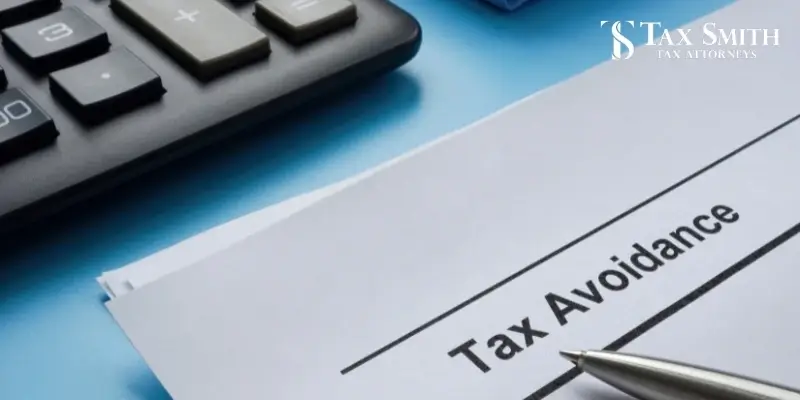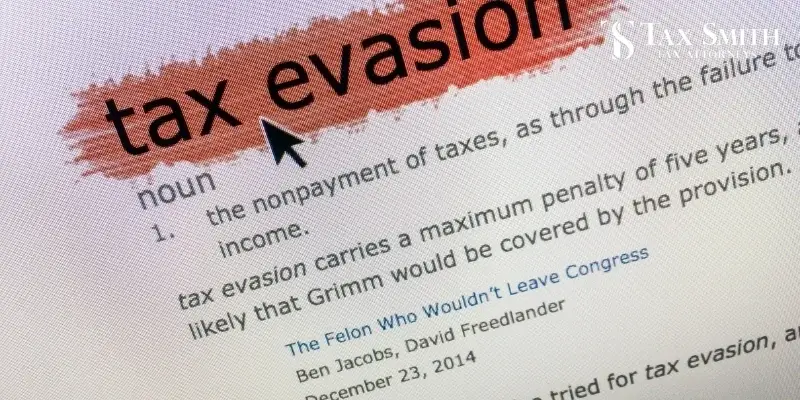Tax planning is important to limit your tax liability fairly and legally. Tax avoidance is a term referring to this process of legally limiting your taxable income and liability. Unfortunately, there are situations where a taxpayer’s actions to avoid taxes become illegal. Though sometimes used interchangeably, the terms have very different meanings. Many taxpayers wonder, “When does tax avoidance cross the line to tax evasion?”

It’s important to understand how the IRS (Internal Revenue Service) defines the two terms and how you can be sure you are operating within the law.
How Does the IRS Define Tax Avoidance?
The IRS defines tax avoidance as actions you take to limit your tax liability and increase the income you have after taxes. When you engage in tax avoidance, you are taking legal steps to improve your wealth and pay the minimum amount you owe in taxes. You are not doing anything wrong; you are taking advantage of the benefits of the system. Tax avoidance involves careful and smart planning based on the deductions and tax relief that are available to you.
Tax avoidance can take some of the following forms:
- Contributing to your retirement account, thus decreasing your taxable income
- Claiming tax credits you are allowed, such as for childcare
- Claiming interest deductions
- Investing in tax-free and tax-efficient accounts or assets, such as an IRA or through buying bonds
- Making charitable donations and contributing to non-profits to lower your taxable income
- Making gifts to trusts or foundations
- Selling investments and assets with less value to offset your gained assets
There are many other potential strategies for tax avoidance. Planning ahead with the right tax professionals can help you find legal options for reducing your taxable income and helping you save. Working with a professional can also keep you from crossing the line into tax evasion. For individuals facing scrutiny over tax issues, an IRS tactics attorney Jacksonville can provide critical guidance and defense.
How Does the IRS Define Tax Evasion?
Tax evasion is defined as failing to pay your taxes or deliberately underpaying the taxes you owe the IRS. For underpayment to be considered tax evasion, intentionality is important. Making an error that leads to you underpaying your taxes can be corrected. Actions may become tax evasion only if you fail to address and correct them.
However, failing entirely to pay your taxes is a different matter in Florida; if you continue to fail to pay the tax, it is tax evasion, even without intentionality.
Tax avoidance becomes tax evasion when you take deductions or relief you do not qualify for, lying about your income, your expenses, or other elements to mitigate your tax liability. It is illegal, and you can face criminal consequences for tax evasion. Some examples of tax evasion include:
- Failing to report all your income, concealing income from other jobs or commissions
- Not reporting interest accrued on loans
- Claiming deductions that are incorrect, overstating the deductions you are owed, or inflating expenses
- Falsifying documents and records to reduce tax liability
- Hiding income and money in offshore bank accounts
These are illegal actions, which can result in serious consequences for both individual and business owner taxpayers. Business owners often have more options for potential tax evasion than individual taxpayers, so businesses are under higher IRS scrutiny.
Tax avoidance becomes tax evasion when the tactics you are using to limit your tax liability are no longer allowed under the IRS guidelines. You must be able to prove that you qualify for a deduction or any other limitation of your liability.
Penalties for Tax Evasion
Tax evasion is a felony offense under federal law. Willful evasion of an imposed tax results in the following penalties if convicted:
- Up to $100,000 in fines for individual taxpayers
- Up to $500,000 in fines for corporate taxpayers
- Imprisonment for up to five years
- Both fines and imprisonment
These fines are in addition to the costs of prosecution. These are very serious consequences, so they should not be taken lightly.

FAQs About Tax Avoidance Cross the Line to Tax Evasion
At What Point Is It Tax Evasion?
Avoiding taxes becomes tax evasion when a taxpayer fails to pay or purposefully underpays their taxes. Tax evasion may occur when taxpayers take deductions they should not or fail to report income, thus intentionally not paying the full tax amount they owe on their earnings.
Taxpayers might neglect to report cash earnings, overstate the deductions they are owed, or put assets in an offshore account. Tax evasion also occurs when taxpayers do not pay their taxes at all, even if it is not deliberate. It is illegal to engage in tax evasion.
Is Tax Avoidance Legal, While Tax Evasion Is Illegal?
Yes, tax avoidance is legal, while tax evasion is illegal. Tax avoidance is the term for limiting your tax liability by taking actual deductions and otherwise reducing your taxable income. This is effective tax planning. Tax evasion involves lying and falsifying documents to pay less than you owe or avoiding paying taxes at all.
How Is Tax Avoidance Different From Tax Evasion?
Tax avoidance is different from tax evasion because tax avoidance is legal. Tax avoidance and tax evasion both intend to mitigate your tax liability, but tax avoidance occurs when you mitigate your tax liability by taking legal deductions, relief, and allowances. Tax avoidance uses transparent methods to save taxpayers money, while tax evasion involves hiding true earnings or intending to pay less in taxes. If you are caught evading your taxes, you can endure significant consequences, including criminal penalties.
What Is the Tax Avoidance Rule?
The tax avoidance is to make sure the methods you use to mitigate your taxes are legal, including:
- Claiming tax credits
- Taking legal deductions
- Contributing to a retirement account
- Contributing to non-profits and other charities
- Minimizing your capital gains liability through the sale of assets
- Tax-free investment instruments, including bonds
- Restructuring a business to be more tax-efficient
To be sure you are using legal tax avoidance techniques, it is important to work with a skilled tax professional.
Tax Smith Tax Attorneys: Helping You Secure Legal Tax Relief
Paying taxes can be a stressful and complex process, and many individuals pay more in taxes than they need to because they are unaware of the deductions they qualify for. Working with the right legal support can improve your income situation after taxes while keeping you from accidentally engaging in tax evasion. Contact Tax Smith Tax Attorneys today.








